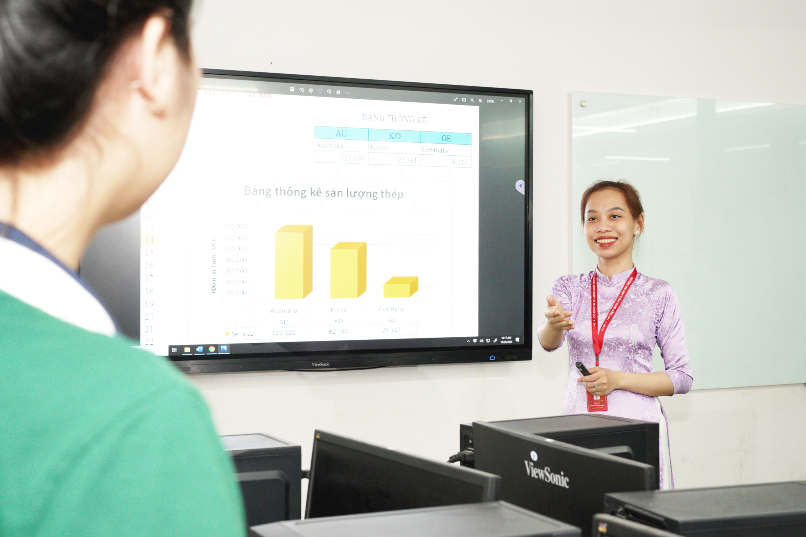In any profession, the circulation of money is inevitable, which is why the Finance and Banking sector holds significant importance for the economy, playing a key role in market regulation. Over the years, Finance and Banking has been recognized as a rapidly growing field and has become one of the most sought-after disciplines among students.
Major code
734021
Enrollment combination
A00: Mathematics, Physics, Chemistry
A07: Mathematics, History, Geography
A09: Mathematics, Geography, Civic Education
D84: Mathematics, Civic Education, English
Academic years
4 yearsDegree
Bachelor

Learning in class, attending lectures, self-study, group work, presentations, practical exercises, essay writing, and internships at enterprises.
A combination of theory (presentations and essays) and practical applications (real-world experiences at enterprises, classes with experts and businesses). The method emphasizes soft skills enhancement (soft skills training classes) and outcome-based education, with input from stakeholders such as businesses, employers, and alumni.
Diverse assessment formats are applied, incorporating digital technology and aligning with the program's learning outcomes. These include Rubric-based evaluations, reports, essays, practical exercises, and more.

CB70303 - Public Speaking Skills
QT70020 - Principles of Economics
TC70102 - Introduction to Finance - Banking
QT70021 - Principles of Marketing
CB70101 - Marxist-Leninist Philosophy
CB70201 - Economic Mathematics
TA70305 - Intensive English 1
CB70301 - Informatics 1
CB70304 - Emotional Regulation Skills
KT70101 - Principles of Accounting
TC70103 - Introduction to Financial Mathematics
CB70102 - Marxist-Lenin Political Economy
CB70106 - Foundation of Law
CB70205 - Applied Statistics
CB71101 - Environment and Sustainable Development
CB71102 - Behavioral psychology
CB71103 - Medical Psychology
TA70306 - Intensive English 2
CB70302 - Informatics 2
CB70305 - Communication and Relationship Building Skills
TC70101 - Foundations of Finance
KT70102 - Taxation
QT71017 - Organizational Behaviour
QT71018 - Principles of Management
CB70103 - Science Socialism
CB71104 - Green economy and Sustainable Development
CB71105 - Vietnamese traditional culture and music
CB71106 - History of world civilization
TA70307 - Intensive English 3
CB70306 - Negotiation Skills
TC71102 - Stock Market
TC71101 - Public Finance
TC70105 - Corporate Finance
TC70201 - Commercial Banking
KT70202 - Data Analytics
TC70104 - Applications of Quantitative Methods in Finance
KT70103 - Economics Law
CB70104 - Ho Chi Minh's Ideology
CB70105 - History of the Communist Party of Vietnam
TA70308 - Intensive English 4
TC70106 - International Banking and Finance
TC70107 - Financial Technology
TC70203 - Principles of Insurance
TC70205 - Banking and Finance major Internship
TC70109 - Information System in Finance
TC71201 - Banking Management
TC71202 - Central Bank
TC71203 - Bank Marketing
KT70207 - Managerial Accounting
TC70108 - Risk Management in Banking and Finance
TC70110 - Corporate Finance Analysis
TC70202 - Simulation of Finance - Banking
TC70204 - Internal Control in Banking
KT71101 - Accounting for Banking
KT71102 - Governmental Accounting
KT71105 - Financial Accounting and Reporting
TC71106 - Valuation
TC71107 - Financial Behavior
TC71204 - Credit Appraisal
TC71103 - Derivatives
TC71104 - Investment
TC71105 - Mergers and Acquisitions
TC70206 - Graduation Internship
TC70207 - Graduation Thesis
TC70208 - Professional Skills in Finance and Banking
TC70209 - Current Issues in Finance and Banking
Students are qualified for various career opportunities, including:
For over two decades, Dong Nai Technology University (DNTU) has grown and developed with the steadfast belief that "Talented and virtuous individuals are the vital essence of a nation.". Our mission is to educate high-quality human resources through technology-based training and experiential learning. We are dedicated to conducting applied research and transferring knowledge to meet societal needs, embrace international integration, and foster sustainable development. DNTU takes pride in cultivating digital citizens who are prepared to embrace the future with confidence.